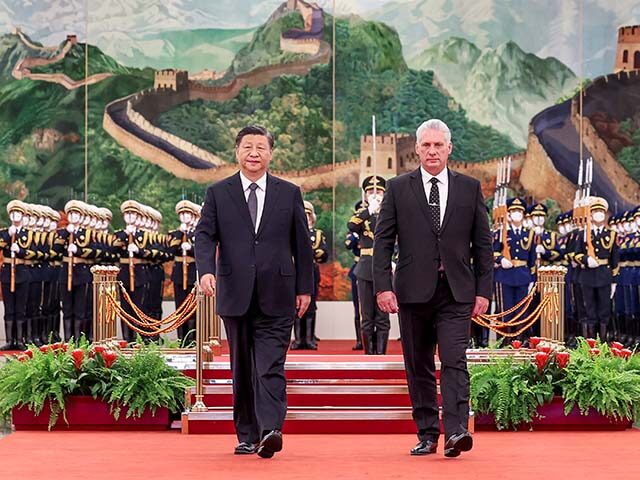A report published by the Center for Strategic and International Studies (CSIS) on Monday indicated that, based on satellite imagery obtained by the organization, Cuba has significantly expanded some of its electronic eavesdropping stations with suspected ties to China.
The report from the Washington-based think tank said that the satellite imagery reviewed offers an “unprecedented look” at four active bases that the communist regime operates in Bejucal, El Salao, Wajay, and Calabazar. CSIS describes the four listed facilities as among the “most likely locations supporting China’s efforts to spy on the United States.”
WATCH — White House: China Placing Troops in Cuba Isn’t a Red Line, We “Made Our Concerns Very Plain” — We’ll “Mitigate” Spy Threat:
CSIS explained that one of the four facilities identified – the base located in El Salao, east of the city of Santiago de Cuba – has been under construction since 2021 but had not been publicly confirmed to exist before. The satellite imagery reviewed for the report showed the base as featuring a large circularly disposed antenna array (CDAA) with a projected diameter of 130 to 200 meters (roughly 426 to 656 feet).
“Once operational, this CDAA will serve as a powerful tool for enhancing air and maritime domain awareness in the region, where the U.S. military and its international partners operate regularly,” the report predicted. “Some CDAAs of this approximate size are reportedly able to track signals anywhere from 3,000 to 8,000 nautical miles away.”
CSIS further explained that, without access to classified materials, pinpointing the specific targets of these assets is “nearly impossible.” It nonetheless described the space-monitoring equipment present at sites like Bejucal and Calabazar as “notable given that Cuba lacks its own satellites or space program.”
“While it could operate downlink capabilities to access satellite data for a range of applications, the types of space-tracking capabilities observed are likely intended to monitor the activities of other nations (like the United States) with a presence in orbit,” the report explained.
“Even limited access to this equipment would provide China a far greater ability to monitor and communicate with its own space assets passing above the other side of the globe,” the report continued. “Like the United States, Russia, and Europe, China operates a global network of ground stations from which it can conduct telemetry, tracking, and command (TT&C) on its satellites and spacecraft.”
CSIS suggested that Cuban eavesdropping facilities would provide the ability to monitor radio traffic and potentially intercept data from U.S. satellites “as they pass over highly sensitive military sites across the southern United States.”
“Collecting data on activities like military exercises, missile tests, rocket launches, and submarine maneuvers would allow China to develop a more sophisticated picture of U.S. military practices,” the report stated.
WATCH — Menendez: Cuba Responded to Biden’s “Unilateral Concessions” by Increasing Repression, Including “Death Penalty for Free Speech”:
“While modern military communications are highly encrypted—meaning the contents of the messages and data are hidden—information on the frequency, origin, direction, and pace of communications traffic can provide significant intelligence value,” the report continued.
CSIS concluded by stressing that intercepting the flow of commercial communications through vital economic centers across the southern United States “could provide a treasure trove of data less restricted by encryption. The region hosts major research and manufacturing centers for industries such as aerospace, electronics, biotechnology, and other key strategic sectors prioritized by Beijing.”
Cuba’s Deputy Foreign Minister Carlos Fernández de Cossio denied the report’s claims in a social media post and accused the Wall Street Journal, which referenced CSIS’ report in an article published on Monday, of being part of an “intimidation campaign” against Cuba.
“[The] Wall Street Journal persists in launching an intimidation campaign related to Cuba. Without citing verifiable sources or showing evidence, it seeks to scare the public with legends about Chinese military bases that don’t exist and no one has seen, including the U.S. embassy in Cuba,” the message read.
The White House confirmed in June 2023 the existence of a Chinese spy base on Cuban territory since at least 2019 — although reports published at the time indicated that the base existed for an undetermined amount of time prior to 2019 but was “upgraded” that year.
The June 2023 confirmation of the Chinese spy base in Cuba was followed by a report in the Wall Street Journal claiming that China and Cuba were in the advanced stages of negotiation to build a joint military training facility in Cuba’s northern coast. The alleged base could potentially lead to the stationing of Chinese troops and other security and intelligence operations within proximity to U.S. territory.
Christian K. Caruzo is a Venezuelan writer and documents life under socialism. You can follow him on Twitter here.

COMMENTS
Please let us know if you're having issues with commenting.